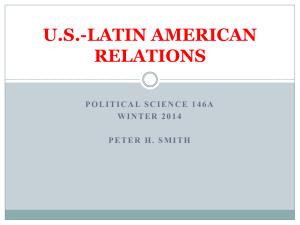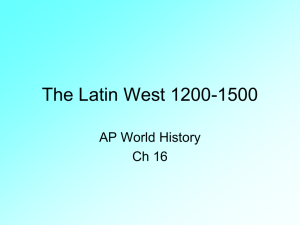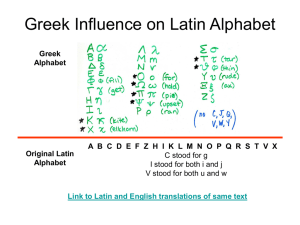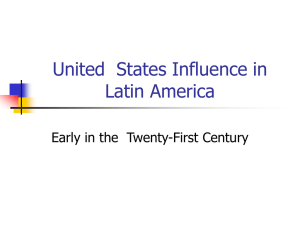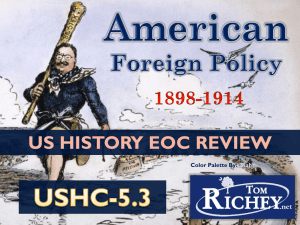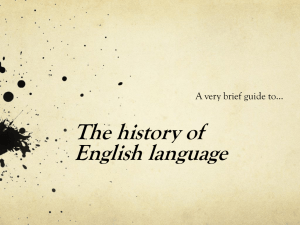Latin for the Whole Child
advertisement
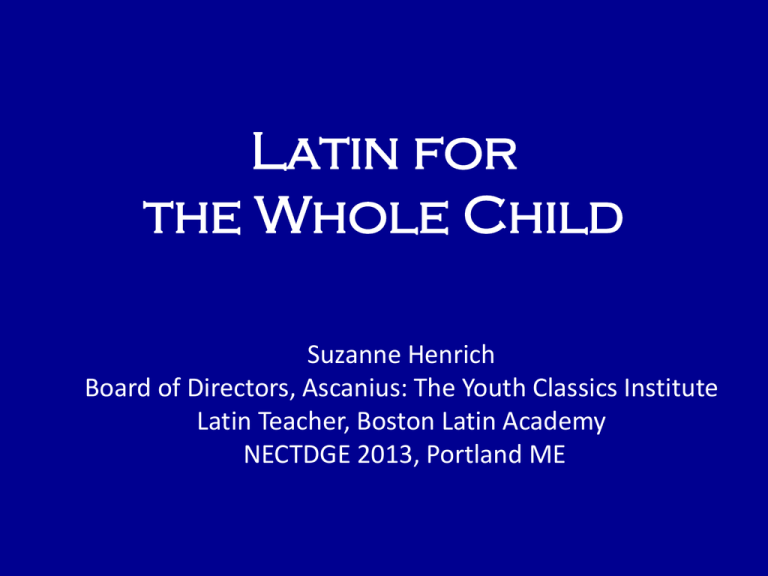
Latin for the Whole Child Suzanne Henrich Board of Directors, Ascanius: The Youth Classics Institute Latin Teacher, Boston Latin Academy NECTDGE 2013, Portland ME Latin for Gifted Students: Why? • Latin is likely new to students, making it exciting and different • Latin helps students understand their own language better • Latin is challenging, and remains challenging as one learns the language • Like math, Latin is cumulative and relies on a student having knowledge of all previously learned skills. Thus it presents continual reinforcement and challenge, which is excellent for independent or self -directed work • Latin is a gateway to understanding much about history, literature, and the human experience •To study Latin is to study not only a language, but also a culture, history, religion, and philosophy. Teachers can use Latin to connect with students of many types of giftedness Lessons in Presentation I. Vocabulary Acquisition (body parts, colors, family) II. Romulus and Remus III. The Natural World & Narcissus and Echo IV. Music through Mythology (Holst’s The Planets) I. Vocabulary Acquisition 1. Introduce new vocabulary 2. Physical practice 3. Musical practice 4. Hands-on practice 5. If desired, explore English derivatives related to the vocabulary I. Vocabulary: Body Parts 1. Introduce new vocabulary: construct Joe Body Parts (as a class or individually) 2. Physical practice: Simo dicit (Simon Says) ** 3. Musical practice: Body Parts Chant 4. Hands-on practice: draw and label your partner’s body I. Vocabulary: Body Parts I. Vocabulary: Colors 1. Introduce new vocabulary: Colors powerpoint 2. Physical and Musical practice: Colors Song with props** 3. Hands-on practice: Slap the Colors game 4. Derivatives: http://www.classicsunveiled.com/romevd/html/deriv main.html http://www.etymonline.com/index.php I. Vocabulary: Family 1. Introduce new vocabulary: Pictures of students’ families 2. Musical practice: Family Song 3. Hands-on practice: Create and label a family tree (hanger or potted) 4. Derivatives II. Romulus and Remus 1. Tell the story in English, listen to the story in Latin 2. Students examine authentic Latin text and match English words in the translation to the Latin words** 3. Students draw a comic of the story, labeling it with Latin from the authentic text 4. If desired, students can compare and contrast the story of Romulus and Remus with other stories (Moses, foundation myths from ancient cities especially Argos, Padua (ancient Patavium), and Carthage). II. Romulus and Remus III. Natural World & Narcissus and Echo 1. Introduce Nature vocabulary 2. Students play Nature Flyswatter game to practice 3. Go on a nature scavenger hunt– then students label their finds in Latin 4. Tell the story of Narcissus and Echo 5. Students read the Latin story, and use it to fill in the blanks in the English translation ** 6. Students act out their portion of the story 7. If desired, play Mad Libs! Students give you Latin words to fill in the blanks in a Nature Myth story. IV. Mythology through Music 1. Students listen to The Planets by Holst, and hold up words that show the emotions in the music ** 2. Students can also listening to the music and draw images based on what they hear 3. Students can then compare the music to authentic images and stories of the gods- does the music give the same impression of the god, why or why not? 4. Students write (in English or Latin) riddles about the gods and share them with the class, who have to guess which deity is described Resources and Materials Resources for teaching Latin: Minimus, Cambridge Latin Course Ascanius Resources: Mingle with Myth: myth lessons and activities by topic/story Leap into Latin: beginning Latin lessons and activities by topic Readings from Mythology: adapted Latin readings for beginning to intermediate student, includes vocabulary, grammar practice and authentic images for comparison Getting to Know Greek: fun introduction to ancient Greek Iota magazine: myth, language, and culture for ES students SCRIBO: Latin composition contest! Questions? Suggestions? Want to try some our activities? Explore our resources for teachers: www.ascaniusyci.org/teachers.htm Find powerpoints and recordings: www.ascaniusyci.org/companion/artmyth/ Contact me at: shenrich@ascaniusyci.org



